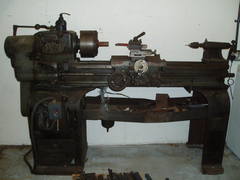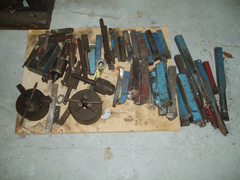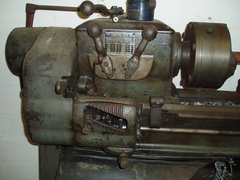
Sebastian lathe
albertz - 16/3/09 at 12:22 PM
Has anyone heard of, or used, a Sebsatian lathe? There is one for sale locally that i am interested in, but thought i would seek your opinions before
committing!!
Hopefully the images are now a more resonable size!!!


lathe 1


lathe 2


lathe 3
If the photos dont work then they are all in my photo archive in their own folder.
The lathe is very old, but apparently all works, although slight play in some feeds. All the tooling shown in the photographs is included in the sale
and the lathe is single phase.
Any opinions or comments appreciated.
[Edited on 16/3/09 by albertz]
fatfranky - 16/3/09 at 12:23 PM
Is this link any use
Sebastian gold seal lathes
BTW I can't see your pictures
Regards
Frank
Edit again
CAN see your pictures now (sort of) but they're massive- might have to buy a 42" screen
[Edited on 16/3/09 by fatfranky]
[Edited on 16/3/09 by fatfranky]
Mr Whippy - 16/3/09 at 12:31 PM
that might have been last owned by a Dinosaur
omega0684 - 16/3/09 at 12:52 PM
looks a bit old and rustic! 
David Jenkins - 16/3/09 at 12:57 PM
If it runs, and the feeds all work, then it's got to be worth a punt if the price is right.
You'll learn a lot while you get it working nicely and, if you ever decide to upgrade, you'll know more about what makes a lathe good or
bad.
Give it a good looking over for broken or repaired castings, and such like.
The spanner on the back of the headstock is a worry - was there handle that got broken? Or is it just a nut that needs turning now and again? May not
be an issue, but if it's a broken handle then try to look at the casting around it, and at whatever's on the other end of it.
Just one thing - don't underestimate its weight! When you make your decision, consider how to get it home. In my case, I got a local
engineering firm to move my Colchester - best £100 I ever spent (it weighs more than my Locost).
[Edited on 16/3/09 by David Jenkins]
l0rd - 16/3/09 at 01:00 PM
You should consider doing some electrolysis before you do any work with it.
coozer - 16/3/09 at 01:13 PM
Looks older than wor lass

Mr Whippy - 16/3/09 at 01:19 PM
might not be much use for small quick jobs as it could take a while to build up steam pressure
David Jenkins - 16/3/09 at 01:21 PM
Put it this way - with it, you will be able to do a lot of jobs that you couldn't do without it...
r1_pete - 16/3/09 at 01:46 PM
Looks a stout bit of kit, many many times better than the pressed tin rubish being punted at the diy'er
James - 16/3/09 at 01:51 PM
Reminds me of someone on here's comment when wilkingj opened up his v8 engine...
"looks like it's lead a long and interesting life".

Cheers,
James
wilkingj - 16/3/09 at 03:39 PM
As long as the bed is true, and there is no major wear on the threads and bearings, it will be good for a lot of jobs.
OK may not be a suer precision machine (due to age / wear etc) but will probably do more than you can (skill wise)!
A bit like my Viento can drive better than I can!
All depends if the price is right.....

MikeRJ - 16/3/09 at 05:10 PM
Someone else restoring a similar model using electrolysis.
albertz - 16/3/09 at 05:44 PM
Thanks for the comments. I served an apprenticeship as a fitter/turner, but with the exception of buiding the Locost haven't really spent much
time on the tools or on the lathe, so will take a bit of time getting back into the swing of things.
As has been mentioned it opens up a variety of options on ways to do things etc that i dont have without a lathe.
Would anyone care to have a stab at guessing the weight? I was planning collecting it with my car and a twin axle Ifor Williams trailer, should be OK
providing the seller can load it onto the trailer for me, which he says he can.
The main thing that worries me is getting spares if something is broken or faulty. I assume things like chucks, toolpost holders etc are standard
fittings, or is this a problem?
Thanks again for the comments.
wheelfelloff - 16/3/09 at 06:13 PM
quote:
Originally posted by albertz
As has been mentioned it opens up a variety of options on ways to do things etc that i dont have without a lathe.
Would anyone care to have a stab at guessing the weight? I was planning collecting it with my car and a twin axle Ifor Williams trailer, should be OK
providing the seller can load it onto the trailer for me, which he says he can.
The main thing that worries me is getting spares if something is broken or faulty. I assume things like chucks, toolpost holders etc are standard
fittings, or is this a problem?
I don't think I would worry about getting spares as you would be very lucky to find any. The lathe was built in the 1920 - 1930 era and imported
from the states, have a look here for some basic information:
http://www.lathes.co.uk/sebastian/page2.html
With things like chucks etc it is usually possible to adapt from something else and most gears/bearings etc can be replicated - with a lathe :-) so as
long as it runs you can repair it. The only issue will be the bed, slideways and feed screws. I wouldn't worry too much as long as the price is
right, a lot of very good work can be completed on a worn lathe once you have learnt its' foibles. The weight I would guess at about 5cwt or so.
Have fun and enjoy using it, it will be much more productive than you think.
regards
Keith
David Jenkins - 16/3/09 at 08:37 PM
It looks lighter than mine, so 250kg is probably about right (mine's around 650kg!). It'll be a nasty thing to move though, as all the
weight is in the top half - very top-heavy.
Do you have access to an engine hoist? That would be the safest way to get it off the trailer.
As for carrying it on the trailer - take some very heavy planks to spread the load, as it will have all its weight on a very small footprint. Also
take some stout ratchet straps, as you don't want it rattling around! 
As for whether the thing works ok - take a 25mm round bar of mild steel and ask him to take a moderately deep skim along most its length at around
600rpm. If the tool is sharp and set properly then there should be no juddering, the surface should be reasonably smooth and each end of the cut
should be the same diameter (he might have to use a centre at the tailstock end of the bar). If the bar has a consistent taper from one end to the
other then that can be adjusted out by moving the tailstock over. If the diameter varies up and down along the length then there may be a few
issues!
More than anything else though, I'd be looking for regular marks caused by chattering, vibrations or whatever, which may indicate that the main
headstock bearing is on its way out.
But, as said above, even a tired old lathe is useful!
[Edited on 16/3/09 by David Jenkins]









